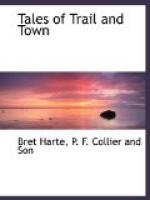*****
But the influence of Johnny’s hidden treasure still remained as a superstition in the locality. Prospecting parties were continually made up to discover the unknown claim, but always from evidence and data altogether apocryphal. It was even alleged that a miner had one night seen the little figures of Johnny and Florry walking over the hilltop, hand in hand, but that they had vanished among the stars at the very moment he thought he had discovered their secret. And then it was forgotten; the prosperous Mr. Medliker, now the proprietor of a stage-coach route, moved away to Sacramento; Medliker’s Ranch became a station for changing horses, and, as the new railway in time superseded even that, sank into a blacksmith’s shop on the outskirts of the new town of Burnt Spring. And then one day, six years after, news fell as a bolt from the blue!
It was thus recorded in the county paper: “A piece of rare good fortune, involving, it is said, the development of a lead of extraordinary value, has lately fallen to the lot of Mr. John Silsbee, the popular blacksmith, on the site of the old Medliker Ranch. In clearing out the failing water-course known as Burnt Spring, Mr. Silsbee came upon a rich ledge or pocket at the actual source of the spring,—a fissure in the ground a few rods from the road. The present yield has been estimated to be from eight to ten thousand dollars. But the event is considered as one of the most remarkable instances of the vagaries of ‘prospecting’ ever known, as this valuable ‘pot-hole’ existed undisturbed for eight years not fifty yards from the old cabin that was in former times the residence of J. Medliker, Esq., and the station of the Pioneer Stage Company, and was utterly unknown and unsuspected by the previous inhabitants! Verily truth is stranger than fiction!”
A TALE OF THREE TRUANTS
The schoolmaster at Hemlock Hill was troubled that morning. Three of his boys were missing. This was not only a notable deficit in a roll-call of twenty, but the absentees were his three most original and distinctive scholars. He had received no preliminary warning or excuse. Nor could he attribute their absence to any common local detention or difficulty of travel. They lived widely apart and in different directions. Neither were they generally known as “chums,” or comrades, who might have entered into an unhallowed combination to “play hookey.”
He looked at the vacant places before him with a concern which his other scholars little shared, having, after their first lively curiosity, not unmixed with some envy of the derelicts, apparently forgotten them. He missed the cropped head and inquisitive glances of Jackson Tribbs on the third bench, the red hair and brown eyes of Providence Smith in the corner, and there was a blank space in the first bench where Julian Fleming, a lanky giant of seventeen, had sat.




